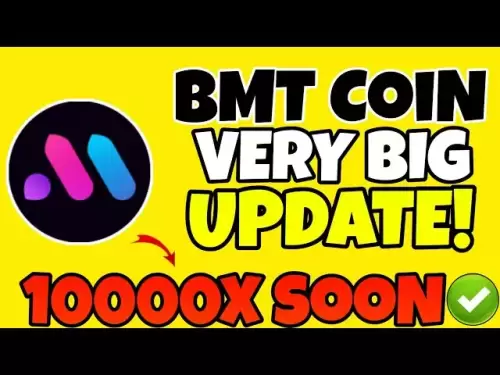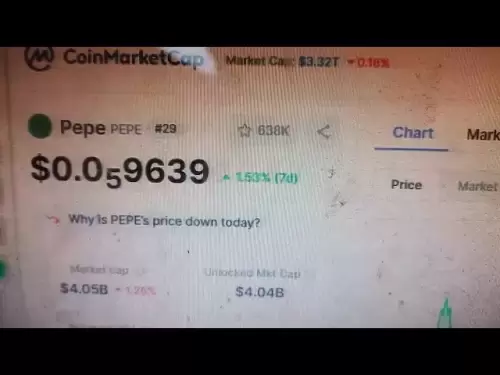-
 Bitcoin
Bitcoin $108,250.0992
0.11% -
 Ethereum
Ethereum $2,515.9404
0.03% -
 Tether USDt
Tether USDt $1.0003
0.00% -
 XRP
XRP $2.2166
-0.19% -
 BNB
BNB $656.5904
0.29% -
 Solana
Solana $147.4122
-0.58% -
 USDC
USDC $1.0000
-0.01% -
 TRON
TRON $0.2830
0.06% -
 Dogecoin
Dogecoin $0.1641
0.27% -
 Cardano
Cardano $0.5739
-0.19% -
 Hyperliquid
Hyperliquid $39.1463
-0.11% -
 Sui
Sui $2.8882
-0.02% -
 Bitcoin Cash
Bitcoin Cash $487.6428
0.31% -
 Chainlink
Chainlink $13.2097
0.07% -
 UNUS SED LEO
UNUS SED LEO $9.0308
0.10% -
 Avalanche
Avalanche $17.8608
0.13% -
 Stellar
Stellar $0.2379
-0.06% -
 Toncoin
Toncoin $2.7400
-0.39% -
 Shiba Inu
Shiba Inu $0.0...01144
-0.36% -
 Litecoin
Litecoin $87.5467
0.66% -
 Hedera
Hedera $0.1538
0.22% -
 Monero
Monero $315.5479
0.36% -
 Dai
Dai $1.0000
0.00% -
 Polkadot
Polkadot $3.3523
-0.71% -
 Ethena USDe
Ethena USDe $1.0003
0.01% -
 Bitget Token
Bitget Token $4.3960
-1.03% -
 Uniswap
Uniswap $7.2663
4.19% -
 Aave
Aave $272.8619
2.04% -
 Pepe
Pepe $0.0...09676
-0.18% -
 Pi
Pi $0.4586
-2.87%
What is the difference between Bybit's perpetual contract and delivery contract?
Bybit offers perpetual contracts with no expiry and continuous funding rate adjustments, and delivery contracts with a set expiry date, each suited for different trading strategies and risk profiles.
Apr 10, 2025 at 05:56 pm
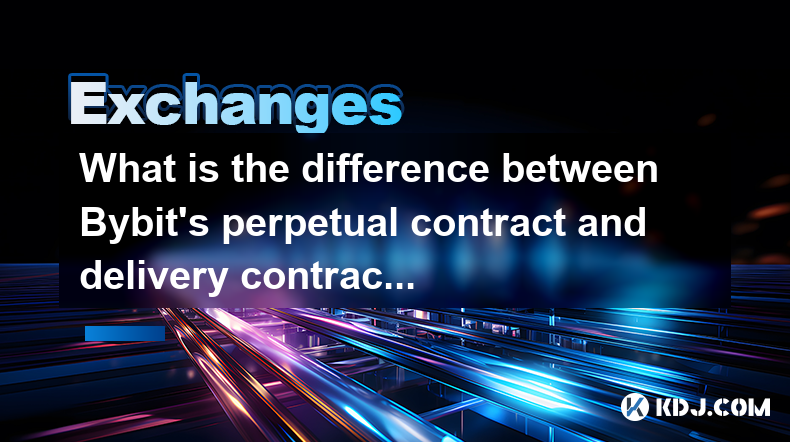
Understanding Bybit's Perpetual and Delivery Contracts
Bybit, a popular cryptocurrency exchange, offers two main types of contracts for trading cryptocurrencies: perpetual contracts and delivery contracts. While both allow traders to speculate on price movements, they differ significantly in their settlement mechanisms and associated risks. Understanding these differences is crucial for choosing the right contract type for your trading strategy.
Perpetual contracts, also known as inverse perpetual contracts on Bybit, are designed to mimic the behavior of spot markets but without an expiry date. This means you can hold your position indefinitely, unlike delivery contracts. The price is determined by market forces and is constantly adjusting. The key mechanism maintaining price parity with the spot market is funding rate adjustments.
Delivery contracts, on the other hand, have a specific expiry date. This means you must either close your position before the expiry date or take delivery/delivery of the underlying cryptocurrency. This introduces additional complexities compared to perpetual contracts, including the need to manage expiry dates and potential complications related to actual asset delivery.
Key Differences Explained: Perpetual vs. Delivery Contracts on Bybit
One of the most significant differences lies in their settlement mechanisms. Perpetual contracts settle continuously through funding rates, which adjust the contract price to track the spot price. Delivery contracts settle at the expiry date, requiring the trader to either close their position or take delivery of the underlying cryptocurrency. This introduces a layer of complexity absent in perpetual contracts.
Another crucial difference is the duration of the contract. Perpetual contracts, as the name suggests, have no expiry date. Traders can hold their positions for as long as they desire. In contrast, delivery contracts have a predetermined expiry date, forcing traders to manage their positions accordingly. Failing to close a position before expiry may result in the actual delivery of the cryptocurrency.
The risk profile also varies considerably. Perpetual contracts carry the risk of funding rates, which can fluctuate depending on market conditions. While generally small, these rates can accumulate over time and impact profitability. Delivery contracts carry the additional risk of price fluctuations closer to the expiry date, as well as the logistical complexities of handling physical cryptocurrency delivery.
Trading fees also differ between the two contract types. While the specific fees are subject to change and depend on the trading volume and other factors, perpetual contracts generally have lower fees compared to delivery contracts. This is partly because of the simpler settlement process.
Liquidity can also vary. Perpetual contracts typically have higher liquidity due to their continuous trading nature and larger number of participants. Delivery contracts, especially those closer to their expiry date, may experience reduced liquidity.
The leverage available also differs. While both offer leverage, the maximum leverage available may vary between perpetual and delivery contracts, depending on the specific cryptocurrency and Bybit's risk management policies. Always check the specific leverage limits before initiating a trade.
Here's a summary of the key differences in a bulleted list:
- Settlement: Perpetual contracts settle continuously via funding rates; delivery contracts settle at expiry.
- Expiry: Perpetual contracts have no expiry; delivery contracts have a defined expiry date.
- Risk: Perpetual contracts have funding rate risk; delivery contracts have expiry date risk and potential delivery complications.
- Fees: Perpetual contracts generally have lower fees than delivery contracts.
- Liquidity: Perpetual contracts typically have higher liquidity than delivery contracts.
- Leverage: Maximum leverage may differ between contract types.
Choosing the Right Contract Type
The choice between a perpetual and delivery contract depends entirely on your trading strategy, risk tolerance, and investment horizon. If you prefer long-term positions and are comfortable with funding rate adjustments, perpetual contracts may be suitable. If you prefer shorter-term trading and want to avoid funding rates, delivery contracts might be a better option. However, be aware of the additional complexities of delivery contracts, especially around the expiry date.
Frequently Asked Questions
Q: What is a funding rate in Bybit's perpetual contracts?
A: The funding rate is a mechanism used to keep the price of a perpetual contract aligned with the spot price of the underlying cryptocurrency. It's essentially a periodic payment made between long and short positions to maintain price equilibrium.
Q: What happens if I don't close my position before the expiry date of a delivery contract?
A: If you hold a long position in a delivery contract until expiry, you will receive the underlying cryptocurrency. If you hold a short position, you will be required to deliver the cryptocurrency.
Q: Are there any tax implications for trading perpetual and delivery contracts on Bybit?
A: Tax implications vary significantly based on your jurisdiction. Consult with a tax professional to understand the tax implications of your cryptocurrency trading activities.
Q: Which contract type is generally considered riskier?
A: Both contract types carry inherent risks. Delivery contracts potentially involve the added complexities of physical cryptocurrency delivery and price volatility near expiry. Perpetual contracts carry the risk of accumulating funding rate charges. The "riskier" type depends on individual circumstances and trading strategies.
Q: Can I switch from a perpetual contract to a delivery contract, or vice versa?
A: No, you cannot directly convert between perpetual and delivery contracts. You must close your existing position and open a new position in the desired contract type.
Q: Where can I find more information about Bybit's contract specifications?
A: Detailed information about contract specifications, including fees, funding rates, and leverage limits, is usually available on Bybit's official website. Refer to their help center or contract specifications page for the most up-to-date information.
Disclaimer:info@kdj.com
The information provided is not trading advice. kdj.com does not assume any responsibility for any investments made based on the information provided in this article. Cryptocurrencies are highly volatile and it is highly recommended that you invest with caution after thorough research!
If you believe that the content used on this website infringes your copyright, please contact us immediately (info@kdj.com) and we will delete it promptly.
- Litecoin Breakout Watch: What Traders Need to Know Now
- 2025-07-06 16:50:13
- Bitcoin, Solana, Ethereum: Decoding the Latest Buzz on the Blockchain
- 2025-07-06 16:50:13
- Widnes Resident's 50p Could Be Your Ticket to Easy Street: Rare Coin Mania!
- 2025-07-06 16:55:13
- Bitcoin, Solaris Presale, and Token Rewards: What's the Buzz?
- 2025-07-06 16:55:13
- Grass Seeds, Garden Experts, and a £1 Coin Hack: Your Guide to a Perfect Lawn
- 2025-07-06 14:30:13
- Cracking the Code to a Perfect Lawn: Grass Seeds, Expert Tips, and the £1 Coin Hack!
- 2025-07-06 14:50:13
Related knowledge
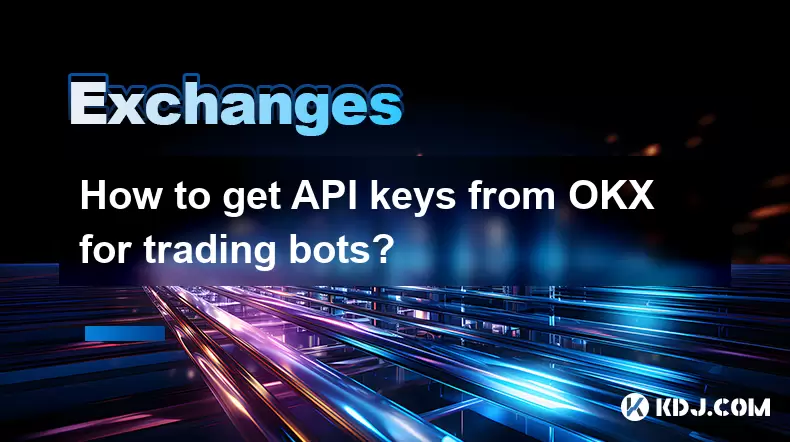
How to get API keys from OKX for trading bots?
Jul 03,2025 at 07:07am
Understanding API Keys on OKXTo interact with the OKX exchange programmatically, especially for building or running trading bots, you need to obtain an API key. An API (Application Programming Interface) key acts as a secure token that allows your bot to communicate with the exchange's servers. On OKX, these keys come with customizable permissions such ...
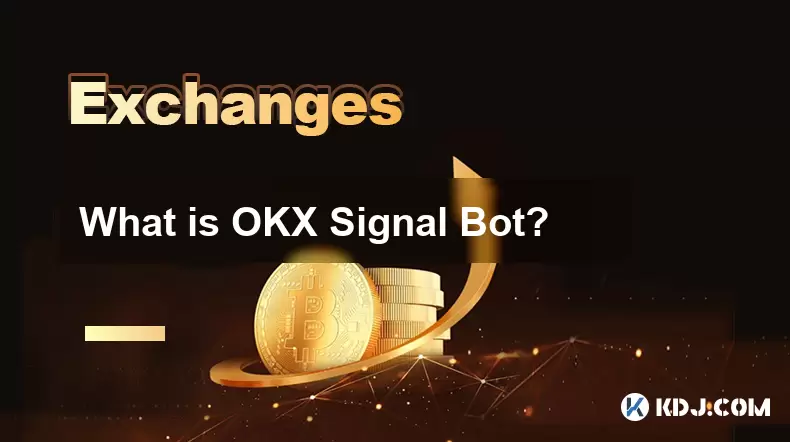
What is OKX Signal Bot?
Jul 02,2025 at 11:01pm
Understanding the Basics of OKX Signal BotThe OKX Signal Bot is a feature within the OKX ecosystem that provides users with automated trading signals and execution capabilities. Designed for both novice and experienced traders, this bot helps identify potential trading opportunities by analyzing market trends, technical indicators, and historical data. ...
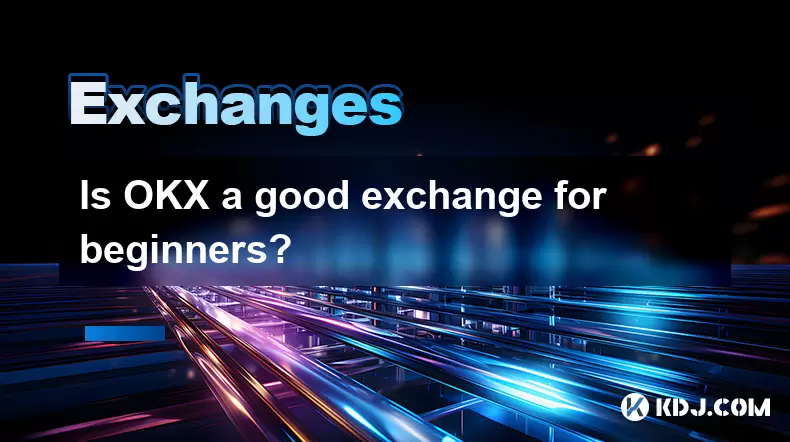
Is OKX a good exchange for beginners?
Jul 03,2025 at 05:00pm
What Is OKX and Why Is It Popular?OKX is one of the leading cryptocurrency exchanges globally, known for its robust trading infrastructure and a wide variety of digital assets available for trading. It supports over 300 cryptocurrencies, including major ones like Bitcoin (BTC), Ethereum (ETH), and Solana (SOL). The platform has gained popularity not onl...
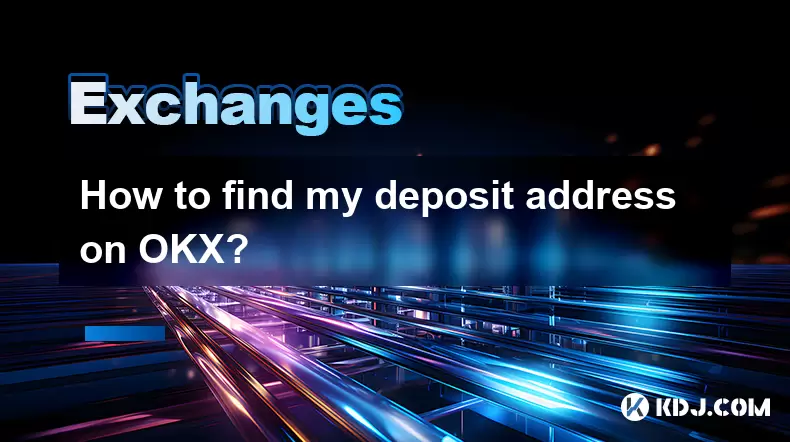
How to find my deposit address on OKX?
Jul 06,2025 at 02:28am
What is a Deposit Address on OKX?A deposit address on OKX is a unique alphanumeric identifier that allows users to receive cryptocurrencies into their OKX wallet. Each cryptocurrency has its own distinct deposit address, and using the correct one is crucial to ensure funds are received properly. If you're looking to transfer digital assets from another ...
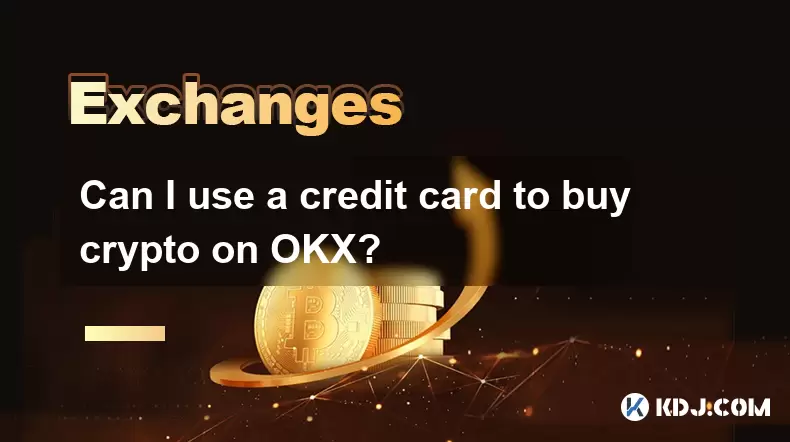
Can I use a credit card to buy crypto on OKX?
Jul 04,2025 at 04:28am
Understanding OKX and Credit Card PaymentsOKX is one of the leading cryptocurrency exchanges globally, offering a wide range of services including spot trading, derivatives, staking, and more. Users often wonder whether they can use a credit card to buy crypto on OKX, especially if they are new to the platform or looking for quick ways to enter the mark...
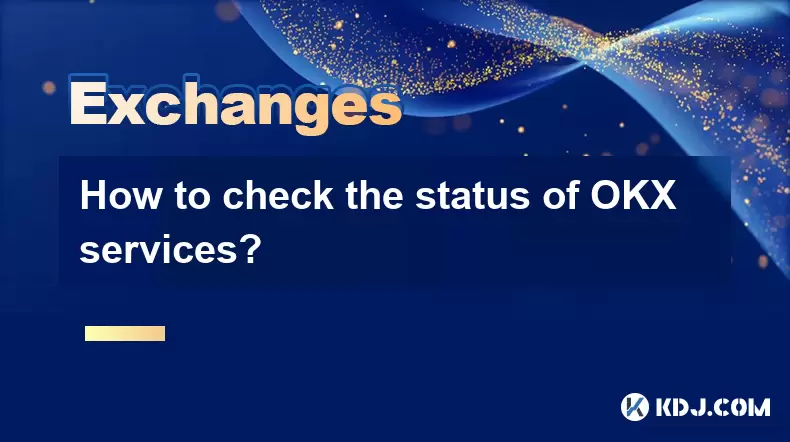
How to check the status of OKX services?
Jul 02,2025 at 11:14pm
What is OKX, and Why Checking Service Status Matters?OKX is one of the world’s leading cryptocurrency exchanges, offering services such as spot trading, futures trading, staking, and more. With millions of users relying on its platform for daily transactions, it's crucial to know how to check the status of OKX services. Downtime or maintenance can affec...

How to get API keys from OKX for trading bots?
Jul 03,2025 at 07:07am
Understanding API Keys on OKXTo interact with the OKX exchange programmatically, especially for building or running trading bots, you need to obtain an API key. An API (Application Programming Interface) key acts as a secure token that allows your bot to communicate with the exchange's servers. On OKX, these keys come with customizable permissions such ...

What is OKX Signal Bot?
Jul 02,2025 at 11:01pm
Understanding the Basics of OKX Signal BotThe OKX Signal Bot is a feature within the OKX ecosystem that provides users with automated trading signals and execution capabilities. Designed for both novice and experienced traders, this bot helps identify potential trading opportunities by analyzing market trends, technical indicators, and historical data. ...

Is OKX a good exchange for beginners?
Jul 03,2025 at 05:00pm
What Is OKX and Why Is It Popular?OKX is one of the leading cryptocurrency exchanges globally, known for its robust trading infrastructure and a wide variety of digital assets available for trading. It supports over 300 cryptocurrencies, including major ones like Bitcoin (BTC), Ethereum (ETH), and Solana (SOL). The platform has gained popularity not onl...

How to find my deposit address on OKX?
Jul 06,2025 at 02:28am
What is a Deposit Address on OKX?A deposit address on OKX is a unique alphanumeric identifier that allows users to receive cryptocurrencies into their OKX wallet. Each cryptocurrency has its own distinct deposit address, and using the correct one is crucial to ensure funds are received properly. If you're looking to transfer digital assets from another ...

Can I use a credit card to buy crypto on OKX?
Jul 04,2025 at 04:28am
Understanding OKX and Credit Card PaymentsOKX is one of the leading cryptocurrency exchanges globally, offering a wide range of services including spot trading, derivatives, staking, and more. Users often wonder whether they can use a credit card to buy crypto on OKX, especially if they are new to the platform or looking for quick ways to enter the mark...

How to check the status of OKX services?
Jul 02,2025 at 11:14pm
What is OKX, and Why Checking Service Status Matters?OKX is one of the world’s leading cryptocurrency exchanges, offering services such as spot trading, futures trading, staking, and more. With millions of users relying on its platform for daily transactions, it's crucial to know how to check the status of OKX services. Downtime or maintenance can affec...
See all articles





















